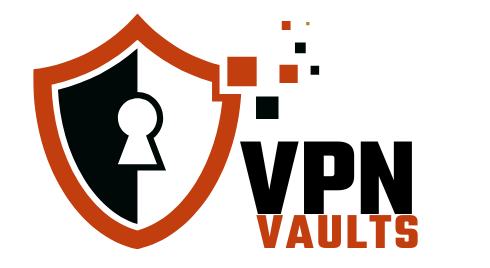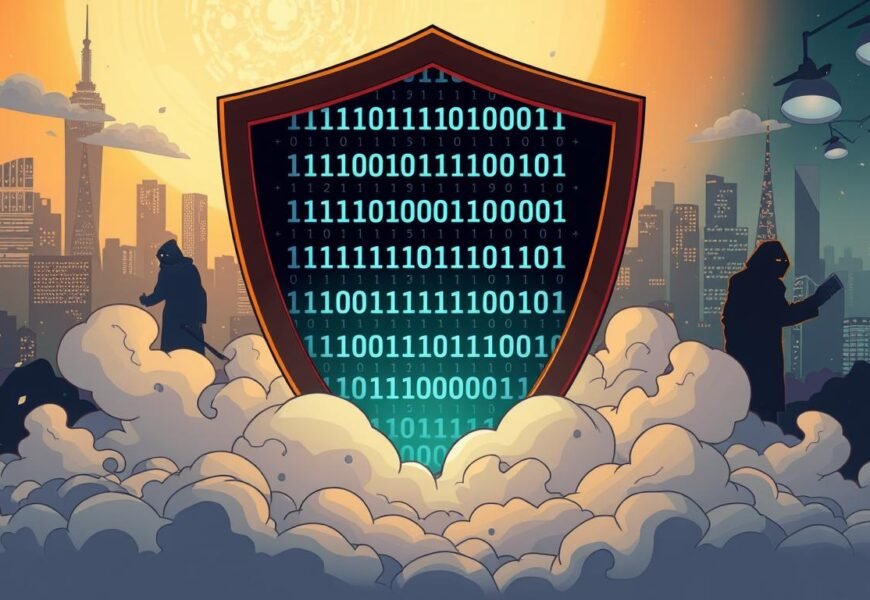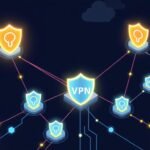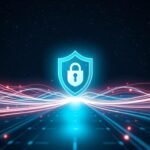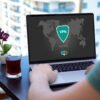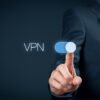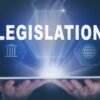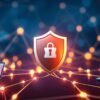In today’s world, our lives are more connected to the internet than ever. This makes online privacy and security crucial. Governments and hackers are getting better at tracking us online. So, how can we protect our personal info?
The answer is a Virtual Private Network, or VPN. VPNs are key in keeping our online activities private and safe from hackers.
VPNs create a secure tunnel for your internet. This makes it hard for others to see what you’re doing online. They can’t intercept your data or get into your private info without permission.
Key Takeaways
- VPNs encrypt your data, making it unreadable during transmission.
- VPNs use tunneling protocols to create a secure “tunnel” for your data.
- VPNs secure your online activities by encrypting data and hiding your identity.
- VPNs protect public Wi-Fi users by encrypting data, making it hard for hackers to access.
- VPNs provide data encryption, stopping unauthorized parties from viewing or changing your data.
Understanding Government Surveillance in the Digital Age
In today’s digital world, governments are watching us more than ever. This makes many people worry about their privacy. It’s important to know how this affects our rights and how to protect ourselves.
Current State of Online Monitoring
Thanks to new tech, governments can watch us better than before. They use special software and work with internet providers to track us. In 2016, Yahoo helped the US government snoop on millions of email users by providing a backdoor. Laws in the US have also made it easier for the government to check our communications.
Impact on Personal Privacy
Government watching can really hurt our privacy. Countries that carry out searches and surveillance without judicial approval include China, Russia, the UAE, Saudi Arabia, Iran, Belarus, Turkey, and Egypt. Places like China, India, and Brazil use cameras and facial recognition to watch us even more.
Common Surveillance Methods
- Intercepting internet traffic through partnerships with ISPs
- Deploying specialized surveillance software to monitor online activities
- Leveraging metadata to track user behavior and communication patterns
- Utilizing facial recognition and CCTV systems to identify and monitor individuals
The Italian spyware company Hacking Team sold surveillance tools to governments, including Ethiopia, Bahrain, Egypt, Kazakhstan, Morocco, Russia, Saudi Arabia, Sudan, Azerbaijan, and Turkey. These methods threaten our privacy and freedom to speak. We need to find ways to fight back.
What is a VPN and How Does It Work
A VPN, or Virtual Private Network, is a tool that boosts your online privacy and security. It routes your internet through an encrypted VPN technology tunnel. This makes your real IP address hidden and your online activities hard to track.
Here’s how it works: You connect to a remote server run by the VPN service. All your internet traffic then goes through this secure encrypted tunnel. This keeps your data safe and private, hiding your online presence from government surveillance or cyberattacks.
VPNs use different protocols for a secure connection. Protocols like OpenVPN, WireGuard, SSTP, and IKEv2 are common. They use strong encryption standards, like 256-bit AES, to protect your data.
“A VPN is like a secure private tunnel for your internet connection, protecting your online activities from prying eyes.”
Using a VPN makes your online experience safer and more private. It keeps you safe from government surveillance or cyberattacks. Whether you’re browsing, streaming, or accessing sensitive info, a VPN is your digital privacy guardian.
VPN for Surveillance: Essential Features and Benefits
In today’s digital world, keeping your online activities private is key. Virtual Private Networks (VPNs) are a strong tool against government spying. They have important features that help keep your identity and data safe while you’re online.
Encryption Standards
VPNs use top-notch encryption to protect your online actions and data. They often use AES-256 encryption, making your online life secure. This strong data encryption helps block government monitoring and cyber threats.
IP Address Masking
VPNs also help hide your IP address. This makes it seem like you’re somewhere else online. It’s great for avoiding anonymous browsing restrictions and hiding from government eyes.
Server Network Coverage
The size of a VPN’s global server network matters a lot. Good VPNs have servers all over the world. This makes it hard for anyone to track your online moves.
With strong encryption, IP masking, and a wide server network, VPNs are a top choice for privacy. They help keep your digital life safe from government snooping and cyber threats.
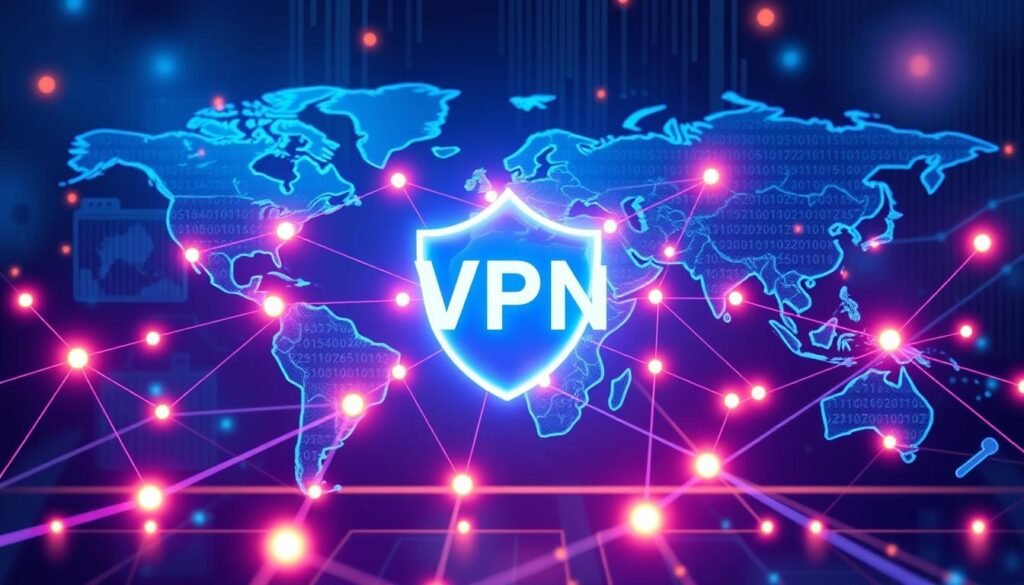
“VPNs are an essential tool for maintaining online privacy and security in the digital age. The combination of strong encryption, IP address masking, and global server coverage makes them a powerful defense against government surveillance and cyber threats.”
Protecting Against Common Cyberattacks Using VPNs
In today’s digital world, cybercriminals are always coming up with new ways to get into our online lives. This makes it more important than ever to have strong cybersecurity. A key tool in this fight is the virtual private network (VPN). VPNs help protect people and businesses from attacks like man-in-the-middle attacks, distributed denial-of-service (DDoS) attacks, and session hijacking.
VPNs encrypt your internet traffic and hide your IP address. This makes it hard for hackers to get to your sensitive data. They use strong encryption, like AES-256, which is also used by governments and the military.
VPNs also stop hackers from trying to get into your system remotely. They protect you from fake Wi-Fi hotspots that hackers use to spy on you. By creating a secure tunnel for your internet, VPNs add a vital layer of defense against common cybersecurity threats.
But, VPNs aren’t a solution for every cyber problem. They can’t stop malware infections or phishing attacks that have already infected your device. To stay safe, you also need to use password managers, two-factor authentication, and keep your software up to date.
“A well-configured VPN can be a powerful tool in the fight against cybercriminals, but it should be combined with other security best practices to provide comprehensive protection.”
Knowing what VPNs can and can’t do helps people and businesses make smart choices. They can use VPNs to boost their online threat protection and cybersecurity plans.
VPN Security Features That Counter Government Monitoring
In today’s world, VPN security is key to protecting your privacy and data protection from government eyes. Top VPN services use the latest tech to fight against government snooping.
Kill Switch Technology
The Kill Switch is a vital VPN feature. It cuts off your internet if the VPN connection fails. This stops your data from leaking, keeping your online life safe from unwanted viewers.
No-Logs Policy
Good VPNs stick to a no-logs policy. They don’t keep records of what you do online. So, even if the government tries to get your data, they won’t find anything, keeping your privacy safeguards strong.
Multi-hop Connections
Multi-hop Connections is another top-notch VPN security feature. It sends your internet through several VPN servers. This makes it really hard for governments to track you online.
With these advanced VPN security tools, you can greatly boost your data protection and privacy safeguards against government spying. Your online actions will stay safe and private.
Best Practices for Using VPNs to Maintain Privacy
In today’s digital world, keeping your online privacy safe is more important than ever. A VPN, or Virtual Private Network, is a key tool for protecting your privacy. To get the most out of a VPN, it’s important to follow some best practices.
First, pick a VPN provider that is known for keeping user data safe. Look for services that use strong encryption like OpenVPN and IKEv2/IPsec. These are better than older, less secure methods. Also, make sure to update your VPN software regularly to stay safe from hackers.
Always keep your VPN on and make sure all your internet traffic goes through it. This stops leaks that could hurt your privacy, like DNS leaks and IP address exposure. Also, check how your VPN provider logs your activities and where they are based. This helps you know how much privacy they offer.
- Use strong encryption protocols like OpenVPN and IKEv2/IPsec
- Keep your VPN software up-to-date to address vulnerabilities
- Verify the VPN provider’s logging policies and jurisdiction
- Route all internet traffic through the VPN to prevent data leaks
Using a VPN with other security steps can make your online life even safer. This includes using a secure browser, avoiding bad links, and using multi-factor authentication. By following these tips, you can make your VPN usage tips and privacy optimization better for secure browsing.

“A VPN is like a shield for your online activities, protecting your privacy and security from prying eyes.”
Limitations of VPN Protection
Virtual private networks (VPNs) help protect against government surveillance and cyber threats. But, they are not perfect. Users need to know about VPN weaknesses to stay safe online.
Common Vulnerabilities
One big issue with VPNs is weak encryption. Old protocols like PPTP can be easily hacked. Also, some VPNs leak DNS, revealing your real IP address. This can break your anonymity.
Even with strict no-logs policies, some VPNs might log your activities. This can harm your privacy.
Additional Security Measures Needed
- VPNs can’t stop malware or phishing attacks. Teaching employees to spot phishing and using multi-factor authentication are key.
- Clearing cookies and teaching social media safety can block some data collection. A VPN might not cover all.
- In some countries, using VPNs can get you in trouble. You might need extra encryption like Tor to stay safe.
- Using strong, unique passwords and multi-factor authentication is crucial. VPNs can’t protect weak passwords or compromised accounts.
- It’s important to check for leaks regularly. This ensures your VPN isn’t exposing your online activities.
VPNs are great for privacy and security, but they’re not enough. Using them with other complementary security tools is necessary. This helps fill the cybersecurity gaps caused by VPN weaknesses.
Combining VPNs with Other Security Tools
For a strong cybersecurity stack and layered security, combining VPNs with other tools is key. Use password managers to create and store strong, unique passwords. Adding two-factor authentication (2FA) helps protect against unauthorized access.
Reliable antimalware software is also crucial for detecting threats. Safe browsing, managing app permissions, and keeping software updated enhance comprehensive protection. Using official apps and securing home routers with VPNs also boosts security.
By integrating VPNs with these tools, users can greatly improve their online privacy. They can also protect against many cyber threats.
Securing Connections with Remote.It
For businesses with many private networks, Remote.It is a secure alternative to traditional VPNs. It lets users access devices and networks remotely without public IP addresses or port forwarding.
This method eliminates the need for old VPN management tools. It reduces security risks and IT overhead for companies. With Remote.It, businesses can connect to many private networks at once without slowing down employee work.
“Remote.It allows users to switch between private networks in real-time with no limitations on the number of networks they can access.”
Considerations for Multiple VPNs
Using multiple VPNs can improve data security and access more resources. However, it has its challenges. Most VPN software only supports one connection at a time, leading to potential issues.
Running one VPN on the main OS and another on a VM can help. But it might slow down performance. Network managers must think about split tunneling and VPN chaining when using multiple VPNs. This way, they can build a strong cybersecurity stack with layered security and comprehensive protection.
Conclusion
Virtual Private Networks (VPNs) are key in protecting our online privacy and security. They encrypt our internet traffic and hide our IP addresses. This makes it hard for hackers, cybercriminals, and even governments to track us.
VPNs offer many benefits. They let us access content and services blocked in our area. They also make streaming and online gaming faster. Plus, they help businesses keep their remote work safe and secure.
But, VPNs aren’t a complete solution for all online safety issues. They add a layer of protection, but we need other security tools too. Antivirus software, firewalls, and more are essential. Knowing what VPNs can and can’t do helps us protect our online lives better.
